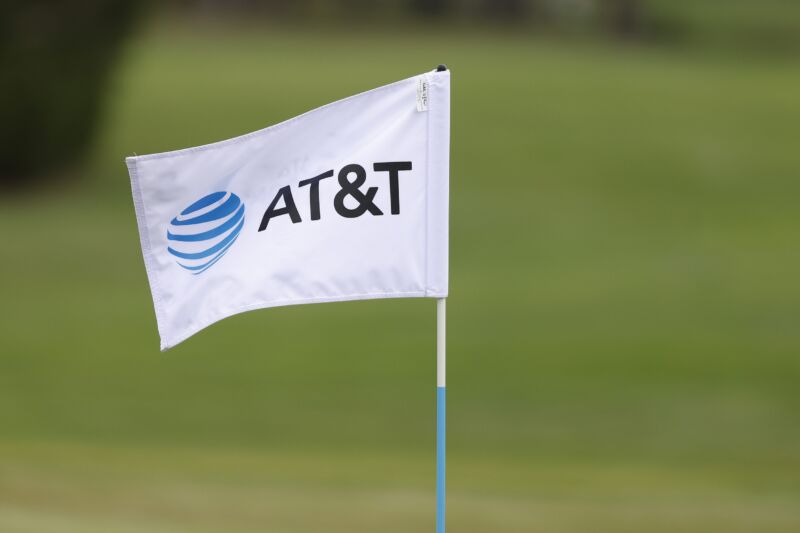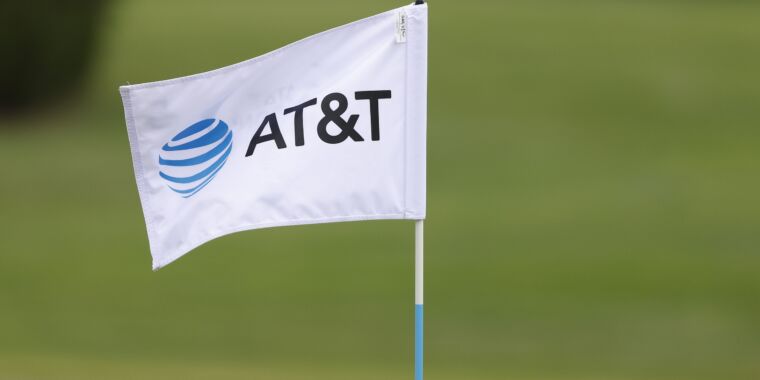
Getty Images | Mike Mulholland
AT&T and other entities are trying to block the SpaceX/T-Mobile plan to provide Starlink satellite service directly to cell phones.
Yesterday, AT&T urged the Federal Communications Commission to reject the SpaceX/T-Mobile proposal. “The FCC’s rules don’t allow SpaceX’s proposed use of T-Mobile’s terrestrial spectrum, and the applicants aren’t even asking for — let alone justifying — waivers from the rules that would be necessary to allow their to authorize the proposed SCS. [supplemental coverage from space] authorizations,” AT&T said.
AT&T said it is interested in the proceeding because it has a license to use adjacent spectrum in the PCS C block. AT&T says the SpaceX/T-Mobile plan, announced in August 2022, “could jeopardize or hinder the delivery of terrestrial wireless services,” including mobile broadband.
SpaceX and T-Mobile’s “technical showings are woefully inadequate regarding the risk of harmful interference from their planned SCS deployments,” AT&T told the FCC. “SpaceX and T-Mobile’s applications fall far short of the exemption threshold and cannot be granted in their current state.”
Plan affects up to 7,500 satellites
The FCC asked for comment on the filing last month, noting that SpaceX was requesting a change to its low-orbit Earth satellite license “to add a direct-to-cellular communications capability to up to 7,500 Gen2 Starlink satellites.” The links to consumer devices would rely on the 1910-1915 MHz (Earth-to-space) and 1990-1995 MHz (space-to-Earth) bands, also known as PCS G-Block, the FCC said.
The FCC works with satellite companies and wireless carriers to close gaps in wireless networks. In a March action, the FCC proposed a new regulatory framework to help satellite operators and wireless companies “harness the growth of space-based services to connect smartphone users in remote, underserved and underserved areas.” But the FCC can still reject the SpaceX/T-Mobile plan or require changes to the plan.
We’ve reached out to SpaceX and T-Mobile today and will update this article if we get a response.
SpaceX recently said it plans to start testing the satellite-to-cell system with T-Mobile sometime this year. Text messaging is expected to be the first supported service, with voice and internet coverage to be added later.
Nationwide wireless group has similar concerns
The SpaceX/T-Mobile role also drew backlash yesterday from the Rural Wireless Association, a trade group for small, rural wireless carriers, and Omnispace, which is partnering with Ligado for a satellite-to-phone system.
The RWA told the FCC it is concerned “that the proposed operations of T-Mobile and SpaceX could cause adjacent channel interference to licensee mobile and fixed network operations in the 1895-1910 MHz and 1975-1990 MHz bands (“PCS C -Block’) in rural and remote areas.”
SpaceX told the FCC that its “direct-to-cellular system will operate without causing harmful interference to or needing protection from any other service properly licensed in these bands” and will “protect adjacent band operations from harmful interference.”
But according to the RWA, “SpaceX does not support this conclusion, nor does it provide protection to ensure there is no interference from adjacent channels.” SpaceX and T-Mobile also have not “provided the results of field trials that would allow the public to analyze the potential for interference from adjacent channels,” the nationwide wireless group said. Omnispace similarly told the FCC that the SpaceX/T-Mobile plan would disrupt existing mobile satellite service networks.
Another opposition filing came in two weeks ago from the National Radio Astronomy Observatory, a government-funded research center. The group said the SpaceX/T-Mobile plan would cause harmful interference in parts of the National Radio Quiet Zone. SpaceX issued a response stating that the astronomy group’s concerns “appear to be more appropriate in the Commission’s general regulation to set industry-wide rules for SCS.”
The FCC sided with SpaceX in a separate battle over spectrum use yesterday. As we reported, the FCC rejected a proposal for a dish network for mobile services in the 12.2-12.7 GHz band because the dish plan would cause harmful interference to satellite broadband services.

